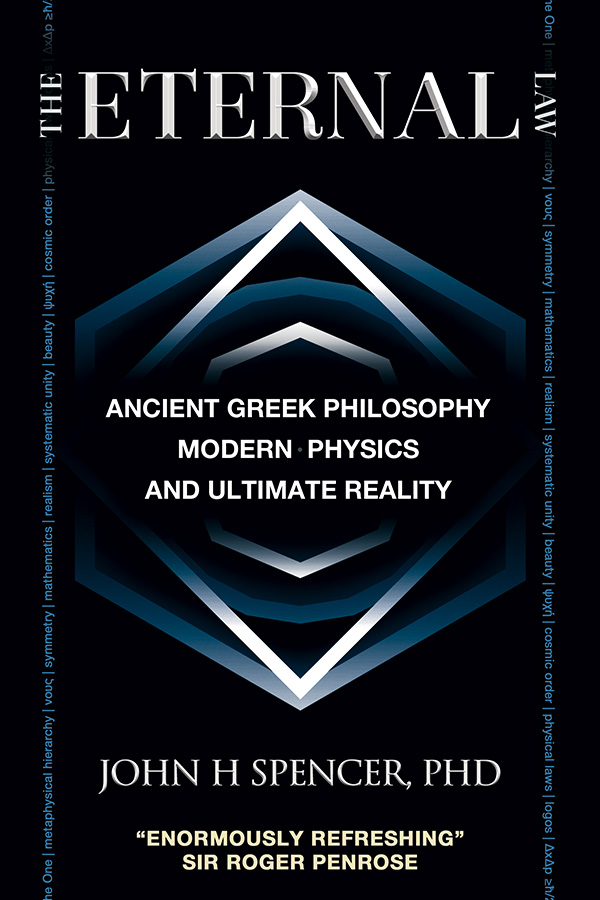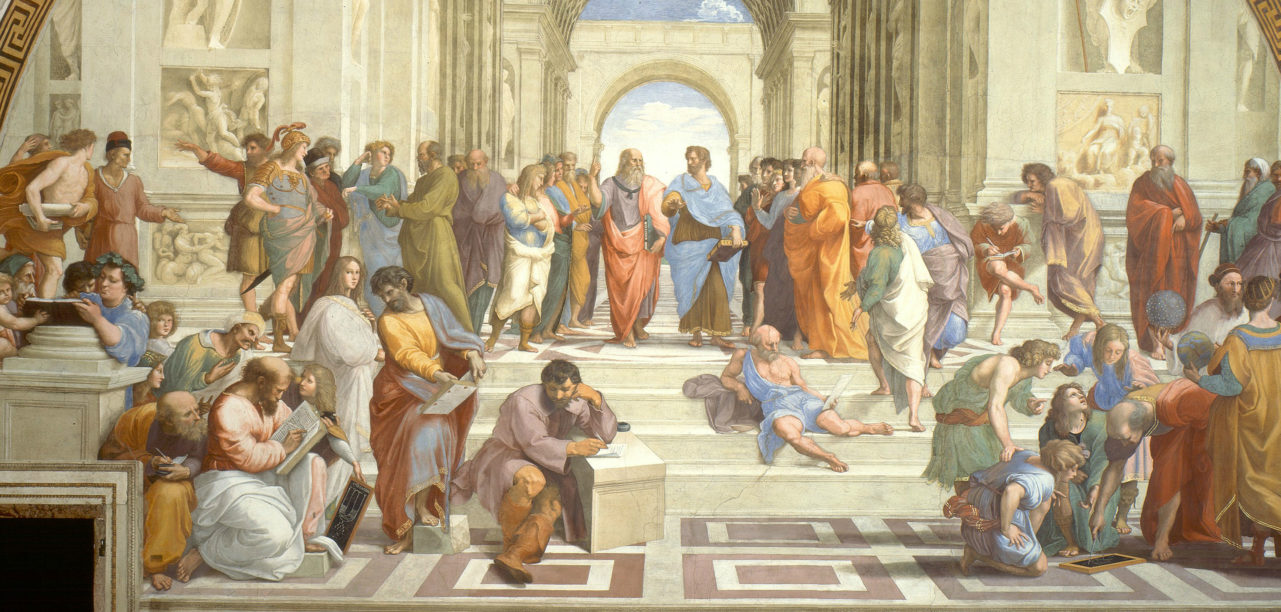The Eternal Law:
Ancient Greek Philosophy, Modern Physics and Ultimate Reality
John Spencer. Param Media (www.parammedia.com), 2012. PP. 344. $34.95. Paper $24.95
Reviewed by Ocean Malandra
The most significant scientific progress occurs when we discover an underlying mathematical law that unites or supersedes previously discovered laws, explaining all that the previous laws explained and even more. If we follow this reasoning process, where underlying mathematical laws become more abstract, more unifying, and therefore simpler, we must logically arrive at one ultimately unifying, simple law, from which all others are derived. This ultimate mathematical law must be real, nonphysical, and un-changing, which is to say that it is eternal. This eternal law, in turn, requires further explanation, leading us through higher metaphysical notions, such as absolute beauty, all the way to ultimate reality, which is pure, absolute One.
—John Spencer
 What does quantum physics actually say about the nature of reality? And how is that in line with mystical beliefs, especially the ancient Platonic world view that has shaped both Western science and spirituality? Those interested in questions like these will find John Spencer’s first book, The Eternal Law, something altogether original—a sound argument for the existence of a non-physical reality of unchanging laws that, if recognized and acted upon, would change society profoundly.
What does quantum physics actually say about the nature of reality? And how is that in line with mystical beliefs, especially the ancient Platonic world view that has shaped both Western science and spirituality? Those interested in questions like these will find John Spencer’s first book, The Eternal Law, something altogether original—a sound argument for the existence of a non-physical reality of unchanging laws that, if recognized and acted upon, would change society profoundly.
The Eternal Law, which has won a handful of independent publishing awards in both science and spirituality, is also a rebuttal of both anti-realism in the sciences and New Age “create your own reality” belief systems, which deny the existence of any underlying objective cosmic order and claim that reality is subjective and random. In exposing these widely held beliefs as false, which he does through both logical exposition and scientific fact, Spencer also lays the groundwork for a seemingly new way of perceiving reality, which is really as ancient as it is universal.
Drawing a deep continuous line from Plato and other major figures in the Platonic school like Plotinus and Proclus, all the way to the pioneers of modern physics like Max Planck, Werner Heisenberg, and Albert Einstein, Spencer shows how important intuition is in scientific discovery, a mode of perception that allows us to access and understand otherwise hidden laws of nature. As Einstein said, “The most beautiful thing we can experience is the mysterious. It is the source of all true art and science.” The Eternal Law delves deep into this experience, shedding light on both the creative and scientific process and arguing that insight is a higher mode of thinking that taps into real and constant metaphysical laws and forms.
While there have been popular books that draw parallels between quantum physics and Eastern spirituality (The Tao of Physics; The Dancing Wu Li Masters), Spencer’s may be the first to show that a Western mystical tradition, Platonism, is also in line with modern findings on the nature of reality. This is important because we live in a global system based on Western scientific discovery. Spencer argues that many of the top innovators in quantum theory were greatly influenced by Platonic thought, which lent them the ability to see into abstract non-physical reality and discover new laws. But in contrast to Eastern civilizations, the mystical perspective has never been fully accepted by Western mainstream institutions, no matter how fundamental it has been to the development of Western science and thought.
This helps explain why modern society can seem so chaotic and confusing, as mystical insight is currently considered unscientific in both the sciences and the academic philosophy community. In order to understand not just the universe and the laws of nature but also who we are and why we are here, Spencer argues, we must return mystical thought and the experiences that flow from it to our everyday lives and let it infuse all of our undertakings.
The highest level of mystic meta-physics is unity itself, a truth that corresponds with most world spiritual systems. Those looking for a book that reconciles religion and science will find a solid bridge between the two here, as Spencer shows that reality can really make sense only when we acknowledge a higher unifying power that is eternal
and infinite.
To this end Spencer critiques atheists like scientist Richard Dawkins, who calls “faith the great cop out” and argues that “Biology is the study of complicated things that have the appearance of having been designed with a purpose.” Dawkins’ bestseller The Selfish Gene goes to great lengths to try to establish that group altruism is unnatural and that survival of individual organisms and their individual genes is the only aim of life.
While this theory has been successfully challenged by biologists like E.O. Wilson, who has shown that among the most successful and organized species on earth, like ants and bees, selfless altruistic behavior is in fact the norm, Spencer travels to deeper metaphysical levels to discredit scientific atheism. Since the laws of physics are unchanging, universal, and nonmaterial, he argues, we all already believe in the existence of a metaphysical realm. The laws of physics are in turn, according to Spencer, the building blocks of higher metaphysical principles like symmetry, beauty, truth, justice, and—ultimately—absolute unity. In The Eternal Law, Spencer also considers the kind of New Age thought promoted by movies like The Secret and What the Bleep do We Know!?, where it is implied that our thoughts create reality and therefore we can do, and have, whatever we like if we just concentrate on it. While quantum physics does show that the observer is a part of any measurement and affects the outcome of any experiment, that does not mean that the observer is creating the situation, Spencer explains. Quite the opposite. What quantum physics has shown is that we are bound by these non-physical laws, which are in operation whether we are aware of them or not, whether we agree with them or not. Far from having the freedom to create reality, we are governed by the eternal law of unity and all of its manifestations. The only freedom we have is in acknowledging this, trying to understand the law as fully as possible, and attempting to live in harmony with it.
Spencer does not spend much time on the social implications of his arguments outside of veiled suggestions that applying the Eternal Law would lead to a spiritual revolution in our lives and a rapid advancement in the sciences. What he does provide is a solid case for unity from a Western scientific and philosophical perspective. ♦
From Parabola Volume 43, No. 2, “The Miraculous,” Summer 2018. This issue is available to purchase here. If you have enjoyed this piece, consider subscribing.
